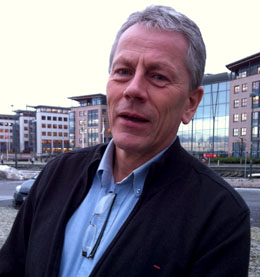Erik Vieth Pedersen has been appointed as the new Chairman for the Board of Directors at the Nordic Council of Ministers’ research institute, Nordregio. Erik Vieth Pedersen is the Administrative Officer at the Ministry of Local Government and Modernisation in Norway.

How do you look upon your new role as Chairman for the Board of Directors at Nordregio? How will you contribute to the work of the Board?
The Board of Directors consists of a nice and competent group of people who are to give advice regarding the investments and further development of Nordregio. Nordregio shall deliver to NCM, EK-R and “the market” and the Board has to reflect this balance. Furthermore, the Board represents the stakeholders, the different Nordic countries, and can add knowledge regarding what is happening in the different countries. As a Chairman I will have to make sure that the conversations about the advice we give are conducted in the right way, that the Board discusses the right subjects and that the Director of Nordregio receives the right support.
My planning experience from the Department of the Environment, municipal experience and current position with the Ministry of Local Government and Modernisation have given me a good basis of knowledge to have opinions on what the Nordregio management requests.
Which question do you regard as the most important or most interesting to work with in 2015?
Nordregio’s economic responsibility is to a greater extent transferred to NCM, the secretariat in Copenhagen and the in house management than it used to be. Nevertheless, the balance between the projects that the market requests and the ideas that Nordregio research staff are passionate about is crucial, and that’s really exciting. Nordregio needs to work with exciting projects to keep their staff, but at the same time there is more time between the larger long-term projects. An important task during 2015 will be to assure that the economy remains stable by securing new projects. It will also be crucial to secure new big EU-projects that can result in exciting long-term assignments for the coming years.
Additionally, we should evaluate who the primary users of Nordregio’s services are, and thereafter assess how we can better profile Nordregio towards these crucial target groups.
How do you interpret ”Nordic benefit” within the regional policy cooperation? How can Nordregio contribute towards increasing the “Nordic benefit”?
It often turns out that the Nordic countries are relatively similar regarding values and how our societies are built up. It is therefore useful for us to compare different solutions from the other Nordic countries. Within the field of regional politics there are actually some differences between the Nordic countries, but at the same time we are exposed to the same global trends.
This is one of the reasons why our common knowledge about causes and effects regarding regional politics and planning is an interesting subject. For example, we’re right in the middle of a process of defining bigger and more solid municipalities here in Norway. Knowledge, competence and a more developed academic environment is central in this. Nordregio can supply us with insight in this process and create the “Nordic benefit” for municipalities and regions. I believe that Nordregio is fortunate to be right in the middle of this exciting field!
Please tell us something more personal about your background and why you have chosen to work with regional policies.
I am a qualified economist and started my career in regional and environmental politics. Since then, I’ve had several jobs within regional politics. Mostly planning but also job creation, both theoretically (for the State) and practically, which was for the municipality and “The Royal Norwegian Society for Rural Development”. I have also gone against the global urbanisation trend and moved to a rural area. In addition to my main profession I run a farm in Østfold county, which gives me a nice perspective in terms of what our society looks like from outside the capital. I become inspired through conversations with my local hunting team and the things we discuss around the fire. Also, to make sure that my three sons got more urban impulses than what was offered from home, our whole family lived in Beijing for two years. It was an interesting contrast to the surroundings we were used to; giving us all a broader understanding of global trends. You get a new perspective of “urbanisation” once you’ve seen millions of people on the move!

